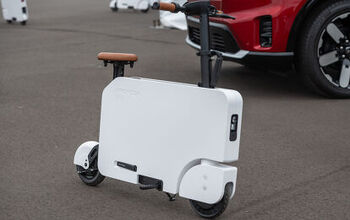Report: Autonomous Vehicles Displacing Traditional Models Over 25 Years
Per a report from Barclays, U.S. new-car sales may fall as much as 40 percent over the next 25 years as shared autonomous vehicles take hold of the market.
Analyst Brian Johnson said large automakers would need to dramatically slash North American production in order to survive a future where nearly half of all families in the market move to a vehicle shared by all members of the family, Bloomberg reports. General Motors and Ford specifically would need to cut production by 68 percent and 58 percent respectively to weather the transition.
Johnson adds annual sales would decline 40 percent to 9.5 million units annually by 2040, while the number of cars on the road would fall 60 percent to 100 million:
While extreme, a historical precedent exists. Horses once filled the many roles that cars fill today, but as the automobile came along, the population of horses dropped sharply.
The analysis points to the rise of four categories of vehicles: traditional models driven by those in rural areas; autonomous vehicles owned by a single family; “robot taxis” summoned via smartphone app; and autonomous vehicles in ride-sharing fleets such as van and bus pools. The shared vehicles would remove nine traditional vehicles from the road, with pooled units taking out 18.
Cost of mobility would also fall regarding the aforementioned robot taxis, with average rates per mile as low as 88 cents for a private car, and 4 cents for a shared two-seater. The category would prove a boon to transportation network companies like Uber and Lyft, as well as low-cost vehicle producers and autonomous tech companies.
[Photo credit: Audi/ Facebook]
Seattle-based writer, blogger, and photographer for many a publication. Born in Louisville. Raised in Kansas. Where I lay my head is home.
More by Cameron Aubernon


































Comments
Join the conversation
The average car is parked 95% of the day. That is a huge inefficiency. Before I moved to NYC from SF, my Speed3 was basically parked all week. Driving is great and all, but the cost of ownership is quite high. As soon as the economics favor autonomous cars (reliable transportation that fits your needs for less money than car ownership) people will make the jump. Because everybody really does want to own a brown diesel manual wagon, it's just that at the moment we have higher priorities and choose not to buy one.
I sincerely believe this is inevitable. I think the 25 years time span is probably optimistic. But consider this, it seems impossible now because the infrastructure is not in place. Autonomous cars are not reality yet, at least for the masses. It doesn't seem desirable now to have to call for a ride, wait, get dropped, do your business then wait. But what if there was an autonomous car around every corner. After putting in the request on your smartphone the car was there by the time you put your shoes on and got out the door. It was waiting for you after work, when you walked out of the mall, etc. And all your transportation needs were covered in just one or two hundred a month. No repair bills, no insurance, no gas, etc, etc. People who grew up on personal car ownership will probably not be keen on adopting this, but for a new generation, it will make financial sense. Those who can afford personal ownership, probably will always have their own car, but I could see this taking a huge chunk of new car sales off the table by the end of this century. It will happen. Period.
Also, I want an A7 with 80s four rings motifs like they used to do. Put it a little lower on the rear door. :)
Human controlled cars can work with a remarkable number of subsystems partially functional or completely non-functional. Windows, climate control, power steering, emissions, lights, bumpers, sensors, door locks, etc. Humans can work around all these things. When cars are autonomous, every system will need to work perfectly at all times. I just don't see a huge number of car owners tying themselves to such a high maintenance and repair standard - at least not more than once.